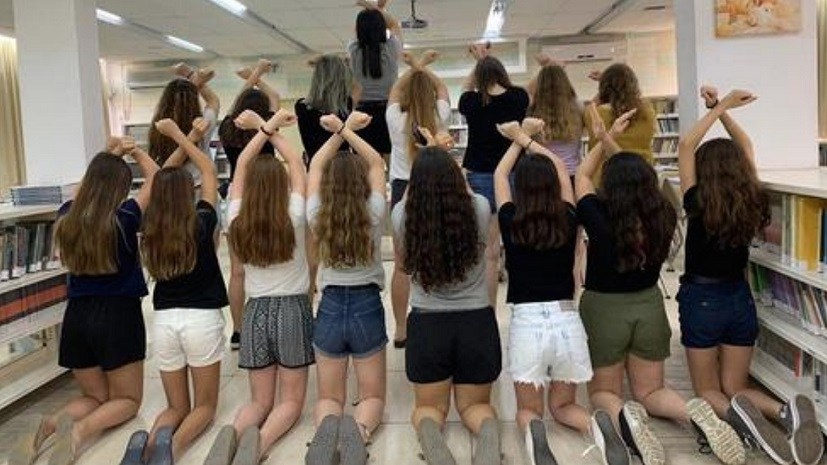A piece of cloth is tearing apart the Israeli society, exposing sharp religious divide in the most modern, secular state in the Middle East.
The issue may sound trivial, but every summer it generates a heated debate on how 'short' shorts should be.
This year the trigger was 13-year-old Kai Vered, who was banned from entering school in the Tel Aviv suburb of Ra’anana because the school authorities thought Kai's shorts were 'too short' and it would distract (read attract) male teachers and the boys in the classroom.
The Israeli girls have always been going to schools in shorts during summer. The question is why a liberal and secular society like Israel has imposed a dress code on girl students, something which has been seen in the repressive Islamic regimes?
The issue of Kai cannot be dismissed as a one-off case because Jewish ultra-right's obsession with women's dress is not new. Even in 2015, a group of girls had written to the then education minister, Naftali Bennett, about the discriminatory dress code in secular schools.
Most Israeli analysts attribute the dress code issue rearing its head again to the rise of orthodox and ultra-religious parties in the political mainstream.
Stopping Kai has unleashed widespread protests by girls, who defied the new diktat of the religious right by going to schools in shorts.
Writing in Haaretz, about the clear divide in the society, Yarden Skop says: "Not only are protests taking place without anyone seemingly coordinating them, but they are exposing the clear generation gap in the educational system, between teachers and principals who tell the girls that the ban on shorts protects them, and girls who believe that this is a “blame the victim” approach. These girls, some as young as 14, are refusing to accept the notion that rape and sexual harassment are linked to what a woman wears."
Rabbi Shlomo Aviner, one of the leading figures of the religious-Zionist community’s hard-line wing, added fuel to fire by issuing '10 Commandants' for a modest dress for 11-year-old girls.
Aviner's post on Facebook drew such strong criticism that it was forced to take it down.
Many questioned rabbi's obsession with dress code for girls only and asked him why there was no similar set of modesty rules for boys.
The lone political voice in the support of girls came from Labour Knesset member Merav Michaeli. Known for her longstanding battle for gender equality causes, Merav posted a video clip on her Twitter account, encouraging the protests of the girls: "Today I want to applaud all of these courageous girls who dared coming to school with their legs [showing]. Yes. This was a courageous act. … They stood together and insisted on their basic right to come to school with their legs [showing]. Boys also came with their legs [showing], but this was quite OK for the female teachers and headmasters who chose to punish just the girls."
French journalist Clothilde Mraffko, who has extensively covered the issue, says: "While the 'shorts rebellion' may appear anecdotal, these teenagers intend to counter the growing influence of religion. Their battle exposed one of the main fault lines of contemporary Israeli society: the opposition between secular and religious Israelis, with how women dress at the forefront of debate.”
Haaretz columnist Allison Kaplan Sommer says in his efforts to portray Israel as part of the enlightened Western world, Prime Minister Benjamin Netanyahu never misses an opportunity to stress the fact that Israel embraces modernity and pluralism over the dangerous fundamentalism and extremism that characterizes the Middle East.
But underneath the freedom and openness that characterizes Israeli secular popular culture lurks a palpable, growing nervousness that society is headed in a more repressive and fundamentalist direction. It’s not a new feeling, but it has picked up steam since the re-entrance of ultra-Orthodox parties into the government coalition and key positions of power, says Allison.
Although the new three-week lockdown to counter the surge in COVID-19 cases may put a temporary lid on ‘shorts rebellion', it will continue to simmer as it has sparked a major debate between the left-liberal and the religious right on what constitutes tzniut (modesty).
The moral policing or the dress code has brought the female body under such intense scrutiny that it has become the biggest source of sexual harassment, which it purportedly aims to prevent.
Asif Ullah Khan


